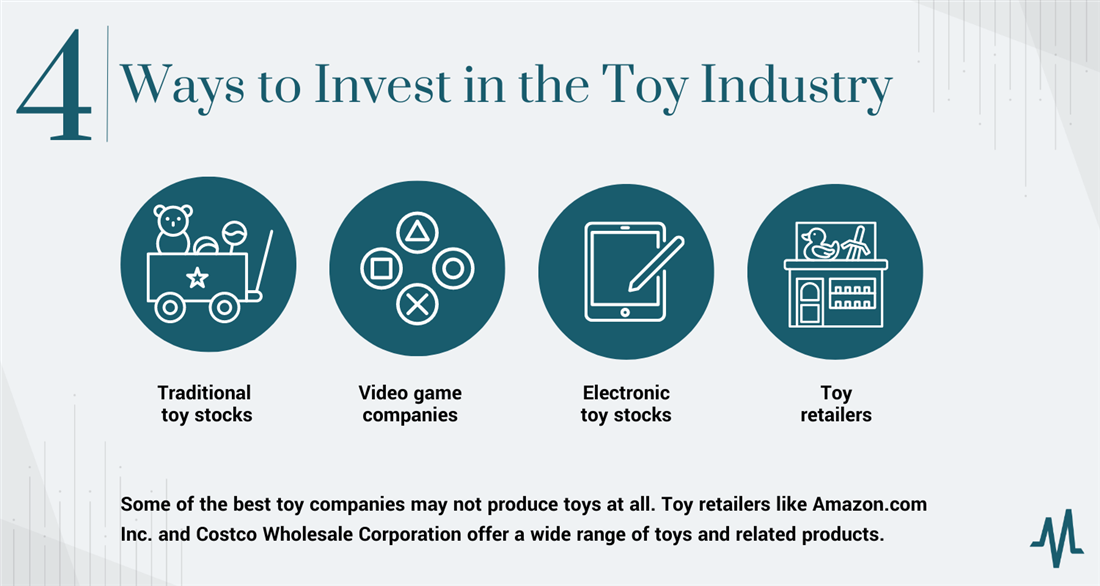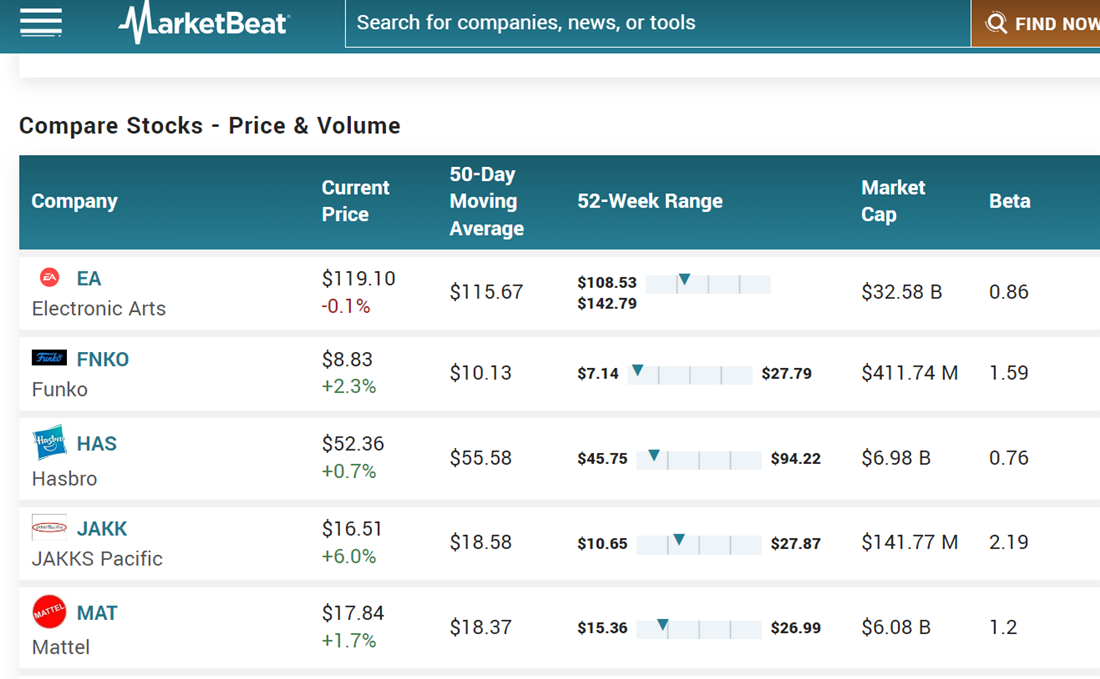Read on to learn more about different ways to invest in publicly traded toy companies as a new investor. Companies in this may be involved in the manufacturing, distributing or marketing of toys and the materials that make them. By the time you finish reading this article, you'll have the know-how to make informed trading decisions on some of the biggest toy brands in the U.S.
Overview of the Toy Industry
Whether it's board games, video games, collectibles, puzzles or toys, publicly traded companies create major toy lines. When looking at the top toy brands on MarketBeat, you'll find retail giants like Walmart Inc. (NYSE: WMT) and Target Co. (NYSE: TGT). While these retailers obviously sell much more than just toys, they remain some of the nation's biggest suppliers of toys and games.
The toy stock sector includes companies devoted to making video games, including industry giants Electronic Arts Inc. (NASDAQ: EA) and Take-Two Interactive Software Inc. (NASDAQ: TTWO). You'll also find traditional toy brands like Mattel Inc. (NASDAQ: MAT) and Hasbro Inc. (NASDAQ: HAS), along with newcomers Funko Inc. (NASDAQ: FNKO). Finally, one of the most well-known toy empires in the world, the Walt Disney Company (NYSE: DIS) has created a media empire but still focuses primarily on children's products and media.
Until today, you might not have realized there were so many options for toy stock investing. While these stocks don't all deal exclusively with toys, they make up over $600 billion in total market capitalization and are natural options to consider when investing.
Why Invest in Toy Stocks?
Toy stocks can be part of a long-term hold or seasonal buys in a trading portfolio. Investing in the types of stocks you are interested in is a good idea, which can make major toy retailers strong choices for long-term holds. Staying informed on changes in the market comes naturally to people who are interested in the end product.
Some toy-exclusive brands we mentioned before, like Mattel and Hasbro, have relatively small market caps and are affordable stocks you might find on a list, like the best low-priced stocks on MarketBeat. Because these are lower-priced stocks, if you grasp upcoming releases or seasonal ebbs and flows of these top toy brands, you can capitalize on these shifts in their stock price.
Many stocks listed as toy stocks are major retailers offering various goods and services. If you're looking for a way to add diversification to your portfolio while also investing in the toy industry, choosing a retailer like Target may help mitigate the risk of investing in individual companies.

4 Ways to Invest in the Toy Industry
There are many types of toy-making companies operating throughout the United States. Investing in multiple areas of the wide-reaching toy market can provide you with more extensive market exposure.
Traditional Toy Stocks
Traditional toy companies manufacture and sell toys that have been popular for generations. These toys can include lines of fashion dolls, action figures, board games, puzzles and more. These toy companies aim to create products that provide entertainment and promote creativity, imagination and socialization among children.
One of the most well-known examples of a traditional toy company is Hasbro. The company has been in business for over 90 years and is known for producing popular franchises such as Transformers, My Little Pony and Monopoly. In addition to creating its own brands, Hasbro has acquired other toy and game companies such as Milton Bradley and Parker Brothers.
Video Game Companies
The video game sector is one of the most dynamic segments of the toy market, continuing to evolve and innovate as consumer tastes change. Video games have become a mainstream form of entertainment, with players of all ages and backgrounds engaging in various gaming experiences. This massive audience, combined with the advent of digital-only game downloads, has caused an explosion in video game companies entering the market. You can explore a list of the top video game stocks on MarketBeat.
Electronic Toy Stocks
Electronic toy stocks refer to companies that manufacture and sell toys incorporating electronic components such as sensors, lights and sound. Electronic toys have become increasingly popular as technological advances have allowed for more sophisticated and interactive toys. These toys can include educational toys, action figures, dolls and board games that feature electronic components.
One of the most well-known electronic toy companies is VTech Holdings, which produces educational toys and electronic learning aids for children. Its most famous line of products is its LeapFrog line of educational toys, which combine fun and age-appropriate learning for children aged one to school-aged.
Toy Retailers
Some of the best toy companies may not produce toys at all. Toy retailers like Amazon.com Inc. (NASDAQ: AMZN) and the Costco Wholesale Corporation (NASDAQ: COST) offer a wide range of toys and related products, including everything from traditional toys like dolls to outdoor sporting equipment and more. They may also provide associated services such as toy assembly and delivery.
Investing in toy retailer stocks can be a way to gain exposure to the broader toy industry, as most of these retailers sell many additional products beyond toys. If you want even more diversification, consider a major retail ETF like the SPDR S & P Retail ETF (NYSE: XRT).
How to Invest in Toy Stock
Investing in U.S. toy companies starts with opening a brokerage account. Once your brokerage account gets up and running, use the following steps to enter the toy market.
Step 1: Compare stocks.
There are many types of toy companies on the market, and it can be a good idea to invest in multiple types of toy stocks to ensure you're spreading your capital risk. If you need help figuring out where to begin, exploring a toy brand list can be a solid place to start. To learn more about the best toy brands, visit your favorite general retailer's website and browse the toy section. You can also compare stocks on MarketBeat according to characteristics like insider percentage holding, MarketRank and more.

Image text: MarketBeat’s list of toy stocks can help you begin exploring potential new additions to your portfolio.
Step 2: Place an order.
Once you decide which stocks to add to your portfolio, place a buy order through your brokerage account. Search for the stock or ETF's ticker using your broker's platform and select the type of order you'd like to place. Most investors use limit or market orders while learning the ropes of the market.
- Market order: A market order is an order to buy or sell a security right away. It does not guarantee the execution price but does guarantee that it will be executed.
- Limit order: A limit order means you’ll buy or sell a security at a specific price or better.
After placing your order, your broker will automatically complete it according to your instructions. If your broker cannot complete the order (for example, if the limit price is not reached), the order may be canceled at the end of the market day or in up to 90 days depending on your preference.
If your broker can complete your order, you'll see shares of the toy company in your portfolio. Your broker will also provide you with tools and resources you can use to monitor your investments' values over time and how they are changing. If you've invested in a dividend stock, you can enable automatic dividend reinvestment to put your savings on autopilot.
Pros and Cons of Investing in Toy Stocks
As with any investment, toy company stocks have their pros and cons. While savvy investors can profit from U.S. toy companies, people who jump in without research might get burned. Check out this MarketBeat dividend calculator for additional research on what kind of return to expect from your investments.
Pros
Check out the benefits of investing in toy stocks:
- Seasonality: Toy companies often experience a boom around the holidays, especially Christmas. Smart investors who can forecast demand for the season's hottest toys or games can cash in on seasonal fluctuations in stock price.
- Interest: Toy stocks are fun and easy to follow, which can be a welcome change of pace for new investors. For example, if you love video games, doing fundamental market research on these companies will be less of a chore.
- Diversification: Any portfolio should have a diverse mix of investments. Many toy stocks operate as large-scale retail operations, providing broad exposure to multiple consumer sectors simultaneously.
Cons
Look at the downsides of investing in toy stocks:
- Long-term fluctuation: The same reason stocks on the best toy brands list are an excellent seasonal buy also makes them a slight risk for long-term holds. Because these stocks fluctuate based on holidays or big releases, expect some ebb and flow.
- Unique supply chain issues: Since toys are physical goods and many are made overseas, issues like import and export laws and supply chain woes can hurt the stock's performance through no fault of the company itself.
Future of Toy Stock Investing
Looking to the future of the toy industry and investing in toy-making companies, it's fun to speculate on the following significant trends in this exciting field.
Some manufacturers are exploring classic toys mixed with the adaptability of video games and emerging technology to expand to a new audience. For example, Hasbro has already adapted its classic Monopoly board game to fit the Steam download platform, allowing players from remote locations to enjoy the game together. These developments should increase further, especially with tech like V.R. coming to the forefront of the gaming sphere.
Tech and toy adaptability will shape the industry's future and investing in toy companies. As we already see, toys are now being marketed by influencers and through popular social media channels. The way the industry shifts into the digital age through modeling toys after popular media is rapidly expanding and will likely only continue the trend of merging physical and digital goods.
Investing in Toy Stocks
Toy stocks can be a fun addition to any portfolio because they allow investors to support something they enjoy. They're an interesting addition to any portfolio but should likely supplement your investment rather than be a significant pillar of your assets. You can combine toy stocks from multiple industry sectors or use a retail ETF to diversify your sector investments further.
FAQs
Take a look at some frequently asked questions about toy stocks.
What is the most profitable toy company?
Toy companies of all sizes and market caps can be profitable, but lately, the best companies, in the long run, are suppliers like Target and Walmart. While these giants don't exclusively sell toys, they play a huge role in distributing today's most popular toys.
Who are the top toy suppliers?
Regarding the suppliers of physical toys, industry leaders Hasbro and Mattel are two of the country's largest, in addition to Disney. Hasbro and Mattel account for about $14 billion in total market capitalization, almost all devoted to toy development and manufacturing.
What are the big companies for toys?
Video game giants like Electronic Arts and Activision-Blizzard are huge in the stock market. Suppliers like Walmart and Target are also viable toy options. Media giant Disney is also one of the top toy producers in the world.
